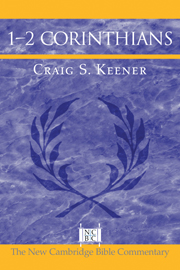Book contents
- Frontmatter
- Contents
- List of Abbreviations
- I INTRODUCTION TO CORINTH AND 1 CORINTHIANS
- II SUGGESTED READING FOR CORINTH AND 1 CORINTHIANS
- III COMMENTARY ON 1 CORINTHIANS
- IV INTRODUCTION TO 2 CORINTHIANS
- V SUGGESTED READING FOR 2 CORINTHIANS
- VI COMMENTARY ON 2 CORINTHIANS
- Author Index
- Scripture and Apocrypha Index
- Index of Extrabiblical Jewish and Christian Sources
- Other Greco-Roman Sources
- Subject Index
V - SUGGESTED READING FOR 2 CORINTHIANS
Published online by Cambridge University Press: 05 June 2012
- Frontmatter
- Contents
- List of Abbreviations
- I INTRODUCTION TO CORINTH AND 1 CORINTHIANS
- II SUGGESTED READING FOR CORINTH AND 1 CORINTHIANS
- III COMMENTARY ON 1 CORINTHIANS
- IV INTRODUCTION TO 2 CORINTHIANS
- V SUGGESTED READING FOR 2 CORINTHIANS
- VI COMMENTARY ON 2 CORINTHIANS
- Author Index
- Scripture and Apocrypha Index
- Index of Extrabiblical Jewish and Christian Sources
- Other Greco-Roman Sources
- Subject Index
Summary
See further relevant resources on Corinth, rhetoric, epistles, and so forth, in the suggested reading for 1 Corinthians.
SITUATION
See, e.g., S. Hafemann, “‘Self-Commendation’ and Apostolic Legitimacy in 2 Corinthians: A Pauline Dialectic?” NTS 36 (1, 1990): 66–88. For one detailed reconstruction of the situation, see P. Marshall, Enmity in Corinth: Social Conventions in Paul's Relations with the Corinthians, WUNT 2, Reihe 23 (Tübingen: Mohr Siebeck, 1987). Despite the overconfidence of his reconstruction in details (especially when addressing the problems in 1 Corinthians), the work's strong grounding in ancient social and rhetorical evidence makes its primary theses likely. By rejecting the patronage of the Corinthian elite, Paul has violated their expectation of “friendship,” risking conventional forms of enmity relationships. Against the frequent practice of mirror-reading Paul's opponents (but concluding that the opponents in 10–13 are “pneumatics”), see J. L. Sumney, Identifying Paul's Opponents: The Question of Method in 2 Corinthians (JSNTS 40; Sheffield: Sheffield Academic Press, 1990).
THEOLOGY
In addition to Dunn (see 1 Corinthians), J. Murphy-O'Connor, The Theology of the Second Letter to the Corinthians (Cambridge: Cambridge University, 1991).
OTHER QUESTIONS
D. A. deSilva, “Measuring Penultimate against Ultimate Reality: An Investigation of the Integrity and Argumentation of 2 Corinthians,” JSNT 52 (1993): 41–70; J. T. Fitzgerald, “Paul, the Ancient Epistolary Theorists, and 2 Corinthians 10–13,” 190–200 in Greeks, Romans, and Christians: Essays in Honor of Abraham J. Malherbe, ed. D. L. Balch et al.
- Type
- Chapter
- Information
- 1-2 Corinthians , pp. 152 - 155Publisher: Cambridge University PressPrint publication year: 2005



